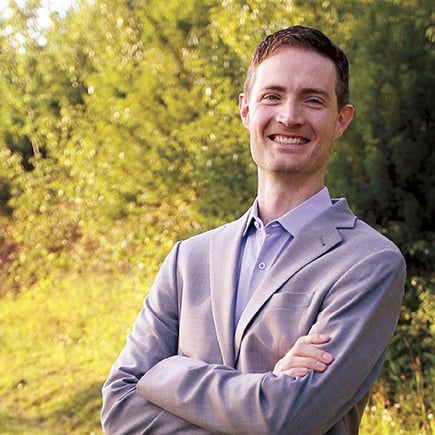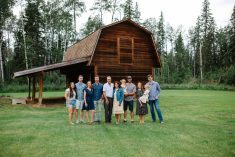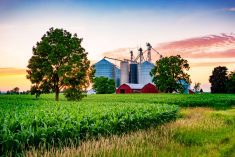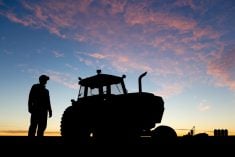When it comes to starting and growing a business, you’re only limited by your imagination.
For Belmont, Manitoba first-generation farmers Lydia Carpenter and her husband Wian Prinsloo, it’s that type of unlimited, outside-the-box thinking that has become their regular way of thinking. Over the years, they’ve leveraged multiple income streams, a direct-to-consumer marketing beef business, unconventional loans and land rental arrangements, and unique payback agreements.
They were among the first to demonstrate that land acquisition is not the only way to determine a farm business’s worth. And in another 10 years, they will likely complete a farm transition, but from a family they’re not related to at all.
Read Also

Lessons from the past: How Canada can reverse its shrinking share of the global food market
A historic look back at how Canada has positively dealt with trade issues — and how those lessons can inform future moves.
You might remember them from previous issues. Country Guide has followed Carpenter and Prinsloo on and off for the last decade and since Luna Field Farm has changed considerably over the last five years, we thought it was a good time to connect and catch up.
They continue to raise and direct market between 60 and 100 weanling pigs and manage a few hundred laying hens. Since we last heard from the couple, they said goodbye to their 300 sheep and 1,000 broilers in 2018 and 2019, respectively.
- RELATED: Following the farming dream
Today, their client base is a solid mixture of urban and rural. Beyond Winnipeg and Brandon, they make weekly beef deliveries to Winkler, Morden, Killarney, Boissevain, Pelican Lake, Ninette, Shilo and Wawanesa. Some customers even travel from northern Ontario to seek out their farm’s products.
The initial 80 acres of rented land that Carpenter and Prinsloo managed has morphed into a half-section of deeded land and an additional rented section from another entity. Their 120 Luing breed cattle are co-run with neighbour and mentor Iain Aitken. “We’re not large scale, but we’re not small anymore for sure,” says Carpenter.
They weathered COVID-19 and came out bigger, better and with a stronger conviction to be a tortoise and not a hare in their slow-and-steady journey toward achieving their goals. The pandemic changed some people’s eating habits and food awareness, driving Luna Field beef sales ever upwards and teaching Carpenter and Prinsloo to play the long game even more than they already were.
Evolving transition
Iain Aitken and his wife Rowena bought nine quarters when they moved to Manitoba from Alberta in 2015. He sold the first quarter of land to Carpenter and Prinsloo in 2017, followed by a second in 2023. Both quarters were sold to Carpenter and Prinsloo for what the Aitkens paid for them in 2015.
“It was my way of giving them a kind of foot up because the real estate evaluation is an ongoing thing,” said Aitken, 58. “Land has gone up, certainly.”
They all share a similar philosophy of systems agriculture and a belief that “unconventional” can be as good, if not better, than conventional. The couple say they are lucky to be where they are and to know Aitken.
Aitken counts himself lucky, as well, especially in today’s farm business climate. It didn’t take long for him to see that the couple could be a viable option to continue his Luing cattle business after he retires. He plans to fully transition his business to the couple by about 2036.
“They’re very knowledgeable and I’ve increasingly seen more of that as I’ve spent more time with them,” says Aitken. “They’re very outside-the-box thinkers. We certainly have very similar values in terms of land management and just the way we do things. We’re very much like-minded in that aspect. They’re the best prospects I’ve ever encountered.”
The young couple understand that this isn’t simply a succession. It’s two healthy, thriving businesses that will, assumedly, become one in time.
“We have run a profitable farm for many years which is one reason that this transition is working and why we decided to work together,” says Carpenter. “Over time, we are purchasing assets from the Aitkens to bring into and grow our business. A key component of our success is that we built the business first, and then we were given the opportunity to build equity in land and cattle [payments we were able to cash flow from the business] and work with Iain.”
The land Aitken sold to Carpenter and Prinsloo provided the security the couple needed to invest in infrastructure and stay in business.
“We needed an opportunity as we needed security and Aitken provided that,” Carpenter says. “We are building equity that will give us additional borrowing power that will serve the transition moving forward as we will be able to cash-flow additional asset transfer. We are moving in a direction that feels good, and we have the security … about the business we have grown and are growing, and the working relationship we have with Aitken. Not everybody gets this opportunity and I think that being able to engage in a farm transition with someone that’s not even your family is a real opportunity.
“I think we all have achieved a greater sense of clarity in terms of what’s going to happen in future or what we want to happen in future.”
Opportunity cost
The couple cautions that as with everything in life, there’s no free lunch. An opportunity will always have a catch, so think it through. Don’t let a Trojan horse into your farmyard.
“Some things will present as an opportunity but they’re not. It might be there, but it’s usually hidden under a bunch of work,” Carpenter says.
For example, Carpenter and Prinsloo had an opportunity to buy neighbouring acreage, but they turned it down. The cost of the opportunity was too high. It’s not always purely about the numbers.
“What is the real cost of that? The real cost might be family time. When you sense that there’s an opportunity, really explore what it is. That’s not just a financial question,” Carpenter says. “We have been really consistent in our business, and I think that part of that consistency is because we have created some limits around what we can’t do.”
They’ve accepted the fact that they cannot say yes to everything. Sometimes a door must close, and that’s okay, as was the case with their sheep and broilers. It provided an opportunity to focus on building their cattle numbers, professional development, and spending more time with their son.
Without an inter-generational backstop, which most farm families have, this wide-open decision-making has helped them develop a resilience all their own.
For Prinsloo, the cliché of “one day at a time” epitomizes his family. They knew years ago that this is where they wanted to be, so they kept working away at their goal, determined to achieve it and not be distracted by the proverbial shiny objects along the way.
“The overarching theme is incremental progress towards our goals and establish ourselves a bit more to own a bit more land,” he says of their increasingly clear vision. “There are some people that believe in continued expansion forever, but that’s certainly not the case for us. We’re about refining value, finding efficiencies and doing more with less. One of our goals is definitely to stay nimble and adaptable.”
Prinsloo underscores the paramount need to stay open to change. If not, he says, prepare to be steamrolled by the economy, especially regarding production practices.
“I don’t know how a young person would succeed now without being open to change. That’s what coming from outside of agriculture has given us. I think that naïveté opens you up to possibility.”
Considering the family is working through a true rarity — a business transition of a non-family member — it’s clear their naïveté is a strength, not a weakness.
















